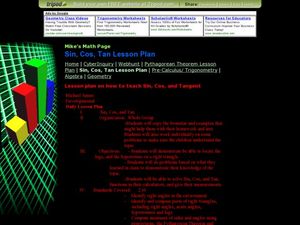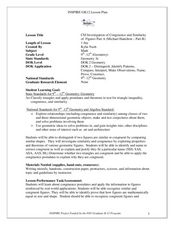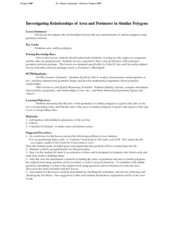Curated OER
Identifying Similar Triangles
In this identifying similar triangles worksheet, 10th graders solve 6 different types of problem that include identifying and comparing similar triangles. First, they identify the three ways that determine whether two triangles are...
Curated OER
Roping Quadrilaterals
Students explore with quadrilaterals. For this roping quadrilaterals lesson, students work in cooperative groups to play the game, "Question, please!" in order to identify, describe, compare and classify quadrilaterals....
Curated OER
Triangle Conjectures
Tenth graders investigate the theorems of ASA, AAS, AAA and ASA. In this geometry lesson, 10th graders discuss the theorems of triangles and how it is used to solve for missing sides or angles. They review how two angles are formed by...
Curated OER
Quilting Geometry
Study geometry through the concept of quilt design. High schoolers examine the geometric shapes in various quilts and then create their own quilts using geometric shapes that fit together. In the end, they write a paragraph to...
Mathematics Vision Project
Geometric Figures
Logical thinking is at the forefront of this jam-packed lesson, with young mathematicians not only investigating geometric concepts but also how they "know what they know". Through each activity and worksheet, learners wrestle with...
Curated OER
Corresponding Parts of Similar Triangles
Here is a lesson that has learners take a look at corresponding parts of similar triangles, ratios of similarity, reductions and enlargements. They'll manipulate the scale factor (r) to observe the changes in similar triangles and then...
Curated OER
Comparing Roots After Rotation of Ninety Degrees
Students conduct an experiment and use different measurements of a single root to illustrate the mechanism of plant movement.
Everyday Mathematics
Mathematics Within: Slope and Triangles
Learners discover a method for determining the slope of a line by creating and comparing similar triangles. They fold coordinate grids to make three similar triangles then measure the sides to compare the relationships between the...
Arizona State University
Tricorn Triangles
Help your learners examine triangles. Pupils explore the different sizes and measurements of triangles. They discover triangles can be isosceles or scalene, and examine the attributes of triangles. Here is the website where you can...
Curated OER
I'm So Sorry I Ate Chocolate
Sixth graders investigate the magnitudes of the sides and angles of a triangle. They determine the proof of the Sine Rule before using it to solve triangles. They compare the Sine Rule to the Cosine Rule in this unit of lessons.
Virginia Department of Education
Similar Triangles
Pupils work in pairs to investigate what it takes to prove that two triangles are similar. They work through various shortcuts to find which are enough to show a similarity relationship between the triangles. Small groups work with the...
Curated OER
Sin, Cos and Tangent
Young scholars find the identity o sine, cosine and tangent. In this precalculus lesson, students solve and identify the different parts of a right triangle. They use the ratios of the Pythagorean Theorem to find the missing side or angle.
Curated OER
CSI Investigation of Congruence and Similarity
Students differentiate between similarity and congruence using polygons. In this geometry lesson, students label triangles based on their properties. They find missing sides and angles using the interior sum theorem.
Curated OER
Investigating Area and Perimeter of Polygons.
Student sinvestigate the area and perimeter of polygons. They differentiate between similar and congruent polygons.. They identify the ratio and proportions of the sides and angles of polygons.
West Contra Costa Unified School District
Congruent and Similar Polygons
What's similar about congruent and similar polygons? Young mathematicians first measure the side lengths and angles of given figures. They use these measurements to determine relationships between side lengths and angles of congruent and...
Cornell University
Constructing and Visualizing Topographic Profiles
Militaries throughout history have used topography information to plan strategies, yet many pupils today don't understand it. Scholars use Legos and a contour gauge to understand how to construct and visualize topographic profiles. This...
National Security Agency
Classifying Triangles
Building on young mathematicians' prior knowledge of three-sided shapes, this lesson series explores the defining characteristics of different types of triangles. Starting with a shared reading of the children's book The Greedy...
Curated OER
Finding the Area of an Equilateral Triangle
The problem seems simple: find the area of the equilateral triangle whose sides are each length 1. In fact, this same problem is solved in 8th grade, addressing a different Common Core standard, using the formula for area of a triangle...
Curated OER
Atomic Absorption Determination of Zinc and Copper in a Multivitamin
Advanced lab apprentices prepare zinc and copper solutions to which they will compare the same minerals from a multivitamin. Using absorption spectroscopy, they analyze the contents of the multivitamin for concentration. This lab can be...
Curated OER
Regarding the Fountain: Questioning Strategy—Cubing
Look deeper into the text with a reading strategy based on asking critical thinking questions. While reading Reading the Fountain by Kate Klise, learners think of questions that help them describe, compare, associate, analyze,...
Virginia Department of Education
Pythagorean Theorem
Investigate the meaning of the Pythagorean Theorem through modeling. After comparing the area of the square of each side, individuals cut triangles and squares to facilitate the comparison.
Curated OER
Basic Visual Language Ii: How To Analyze a Visual Text
Students identify techniques used to communicate visually. They compare and contrast different visual techniques found in mass media. They apply their understanding by creating photographs that use a variety of visual literacy techniques.
Noyce Foundation
Parallelogram
Parallelograms are pairs of triangles all the way around. Pupils measure to determine the area and perimeter of a parallelogram. They then find the area of the tirangles formed by drawing a diagonal of the parallelogram and compare their...
EngageNY
Dilations as Transformations of the Plane
Compare and contrast the four types of transformations through constructions! Individuals are expected to construct the each of the different transformations. Although meant for a review, these examples are excellent for initial...

























